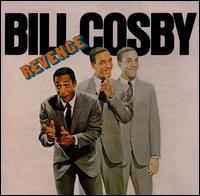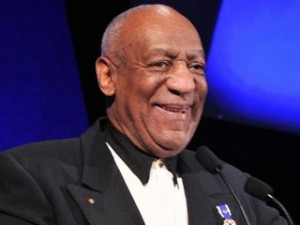My live-music drought ended last week as I attended a couple of club dates associated with the DC Jazz Festival. I saw Cyrus Chestnut at the Hamilton and couldn’t decide whether I was more astonished at how much better he’s gotten at this piano-trio thing or that he’s now months shy of his 50th birthday. (Watching him be clever, engaging and soulful at the same time makes me think he not only compensates for Mulgrew Miller’s absence, but Dave Brubeck’s, too.) I also made my long-overdue first trip to the Bohemian Caverns on U Street to hear the seemingly unstoppable Pharaoh Sanders lead his secular-spiritual congregation in song. (His tenor doesn’t have a fastball any more, but it can still pull a high, hard one out of thin air when he needs it.)
But the best jazz performance I saw this past week wasn’t affiliated with the festival. It was Saturday night at Wolf Trap as Dr. William Henry Cosby Jr. had the Filene Center stage all to himself, sharing it with no one but a pair of sign-language specialists trading off translation duty for the whole two-and-a-half-hours-with-no-intermission-whatsoever show. He spent the whole time talking, just talking…in roughly the same manner that Ben Webster or Pee Wee Russell were just groping for notes on their respective instruments.
Now before I go on…
It’s become a conditioned reflex, especially on the Internet, to acknowledge anything with the words, “Bill Cosby”, as a prelude to (or occasion for) sanctimony or indignation. He has, within the last decade, gone from being an ecumenically beloved entertainer to a polarizing figure, especially within the African American community, whose adults he has challenged or chastised, depending on how you hear him submit his case, to take greater responsibility for their children’s well-being and education. Some believe he speaks the truth that few want to hear while others think he speaks with the haughty arrogance of the wealthy. Then again, even if he hadn’t brought all this up, people will still say he’s haughty and arrogant only because he IS wealthy. Take your pick, brothers and sisters: A passionate “race man” using his power and fame to staunch long-festering socio-cultural wounds with astringent medicine or just another plutocrat playing his own version of that venerable board game, “Blame the Victim.”
I say, with a clear conscience: Whatever. I’ve heard and, at times, even said some of the same things Cosby has about community responsibility — and been resoundingly, unanimously ignored for my trouble. On the other hand, if the Michael Eric Dysons of the world want to rip Cosby a new one, it’s no skin off my ass nose. I don’t have an investment in Bill Cosby the public scourge, philanthropist, educator and TV icon. I am, however, quite weary of the way all these other classifications further diminish or obscure the enduring artistry of a master storyteller adjusting his craft to the pressing demands of age and time.
After all, just about everything I’ve ever learned about narrative development didn’t begin with my reading Dickens or Chekhov or even Garcia Marquez. It began with my exposure to Cosby’s LPs of the 1960s. If all you remember of the first “Fat Albert” story from the 1967 LP, Revenge, is that damned “Hey-Hey-Hey!”, then you’re part of this problem. What I remember is that part of the track where Cosby’s recalling the time he tried to get a rise out of Albert by pushing, shoving and jamming him up several flights of stairs leading to a dimly-lit, horror-movie cut-out of a monster. All the while, the younger Cosby’s anticipating the hilarity that will ensue when jovial Albert is frightened out of his wits. The build-up climaxes with the appearance of the scarifying cutout, punctuated by this sound: “AAARRRRAAAUWWGH” (or something to that effect).
Then there’s a pause, not long, but spacious enough to allow Cosby to say, as blankly and blandly as possible: “I forgot I was behind him.” The sentence stands there, suspended in mid-air. Forty-plus years later, I’m still trying to write something as immaculately framed and timed as that.
Watching Cosby work at Wolf Trap (and he’s been touring with most of this material for some time now), I’m aware that, at 75, his build-ups and pay-offs don’t have that same giddyap they did when he was the 28-year-old phenom able to connect his North Philadelphia childhood memories with the world-at-large either through the telling little detail (“idiot mittens”) or the plausibly implausible exaggeration (“Nine-hundred cop cars!”) And yet, paraphrasing his late friend Dizzy Gillespie, Cosby has benefited from a lifetime’s experience in learning what NOT to say and when NOT to say it. So he now uses bigger frames and larger spaces, letting them do more of the work than the words. Most comedians (and musicians) temper their deliveries, slow their rolls as they age without showing any lapses in their command of time and space. And Cosby, a far more formidable rhythm master as a public speaker than as an actual drummer (by his own admission), can make an evening zoom by while seeming to amble along in measured, deliberate steps. How he’s managed to fill amphitheaters with this slow-hand delivery in the digital age is both a major mystery and a minor miracle.
I’d heard the centerpiece story before: An epic ramble about his eldest daughter’s misadventures with higher education – though I suspect he has by now conflated the experiences with other offspring. He braided this version with other, comparably familiar narrative strands. For instance, how a girlfriend, with the emphasis on the last syllable, changes everything, including the balance of domestic power, upon becoming a spouse. (Yes, Camille comes in for yet more ridicule, but something tells me she enables this treatment — up to what point I suppose we’ll never really know.) Then there are the vagaries of being rich and influential. (Upon asking the president of a college to which his daughter seeks admission whether he could use a hospital, the president asks, “And just how bad were those SAT scores, Mr. Cosby?”) He’s gotten cuffed over the last thirty years for leaning on this persona, to which one can only say that he has as much right, even a duty, to mine material from his rich-and-influential life. He was the lovable curmudgeon throughout, yet the evening was generally sanctimony-free – unless you count his rendering of a college graduation in which the top two students of the class, both foreign-born, accepted their diplomas with circumspection and restraint, while the relative underachievers went into ever-more-elaborate variations of the end-zone celebration. Grouchy or not, the displays made their point, each marking one of the precious few times he got up from his chair.
I’ve read elsewhere that 90 minutes is usually his limit. But the fact that he went over his anticipated two-hour time allotment suggests he was enjoying himself. And maybe these concerts are now his down time from being pressed for commentary about families and education. There are worse ways to blow off steam than frolicking with sound the way a painter plays with light. Hardly anyone thinks of Bill Cosby in such aesthetic terms. And it may be partly his fault that more people don’t. But they should.


